23 Kitchen Countertop Ideas to Fit Any Style
Which kitchen countertop is right for you?


If you’re a fan of HGTV or follow a lot of interior design accounts on Instagram, you may be convinced that you need marble countertops. And maybe you do! But there are a lot of other kitchen countertop ideas out there, from gorgeous wood to sleek soapstone. There are even budget-friendly options made to resemble marble. Whatever you’re looking for, there is something for you, so get ready to be inspired and hire a local countertop contractor to help create your dream kitchen.
1. Marble

Elegant marble is a top kitchen countertop choice in luxury kitchens. The natural stone radiates with a soft glow and has gorgeous veins of color running through it for a unique look.
Marble Fast Facts
Marble countertop cost: About $40 to $100 per square foot for a slab (though you can find prices as low as $15 per square foot and as high as $190 per square foot)
Heat resistant: Yes, though you should avoid leaving hot pans on it
Stain resistant: No, marble is a porous natural stone and can stain easily without frequent sealing
Scratch resistant: No, it's soft and can be easily scratched
2. Granite

Granite countertops are another popular choice in luxury homes due to their durability, variety of color options, and high-end look. Though more affordable than marble, granite countertops are on the higher end of the countertop cost spectrum.
Granite Fast Facts
Granite countertop cost: About $40 to $60 per square foot for a slab (though you can find some as low as $15 per square foot and as high as $140)
Heat resistant: Yes, though hot pans can damage the sealant
Stain resistant: Yes, though it should be sealed to help protect it, and liquids should not be allowed to soak in
Scratch resistant: Yes
3. Quartz
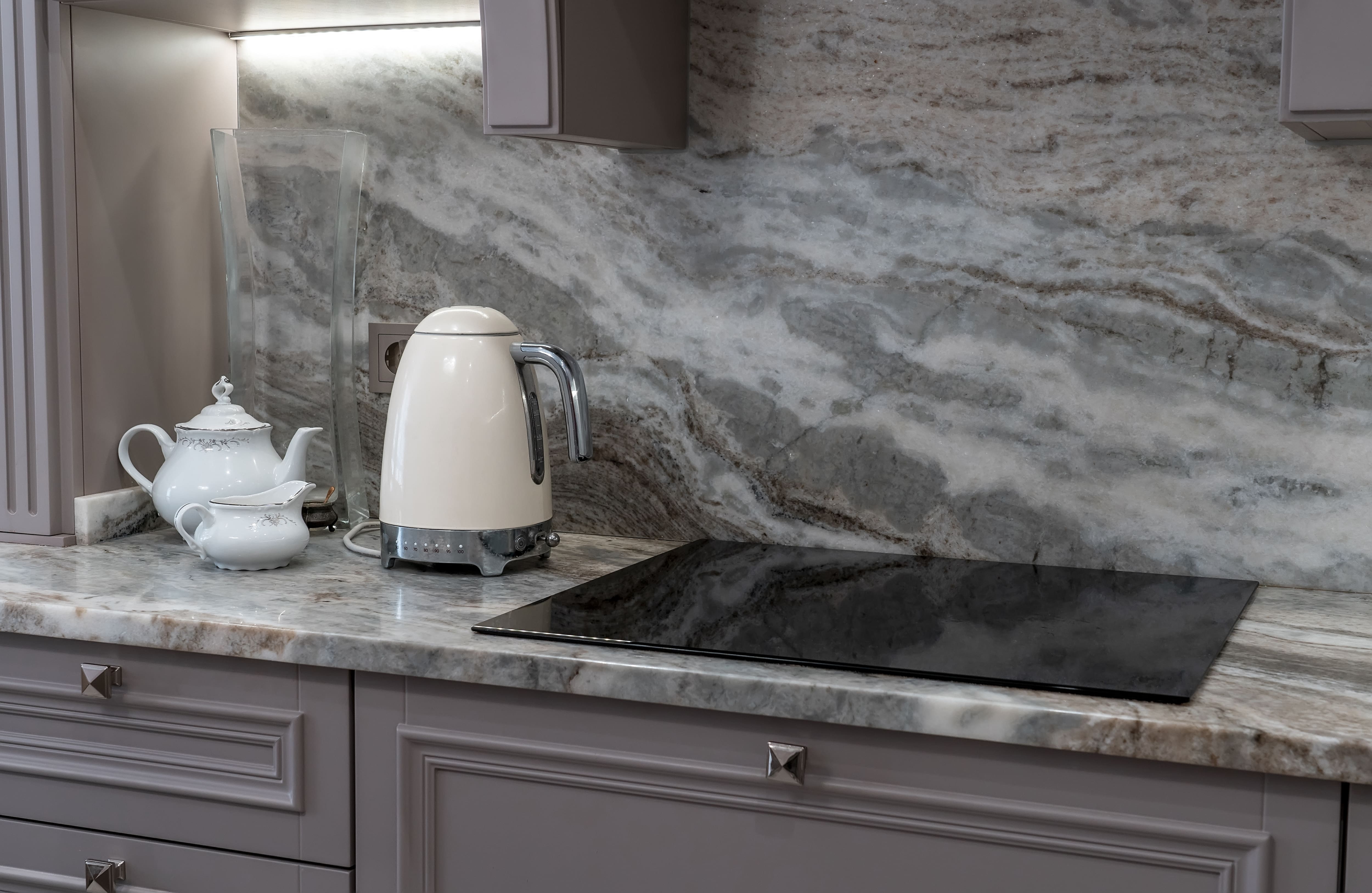
Unlike natural stone countertops such as granite and marble, quartz countertops are a man-made product combining the natural mineral ground quartz with synthetic materials to create a kitchen countertop that resembles natural stone, but is cheaper and often more durable. Quartz also comes in a variety of colors to match any kitchen design. White quartz countertops are particularly popular because they go with everything and come in patterns that resemble marble.
Quartz Fast Facts
Quartz countertop cost: About $70 to $100 per square foot installed (though some can be as low as $15 per square foot and others as high as $150 per square foot without installation)
Heat resistant: Yes, though hot pans can cause it to scorch and crack
Stain resistant: Yes, it's especially resistant to stains
Scratch resistant: Yes
4. Quartzite
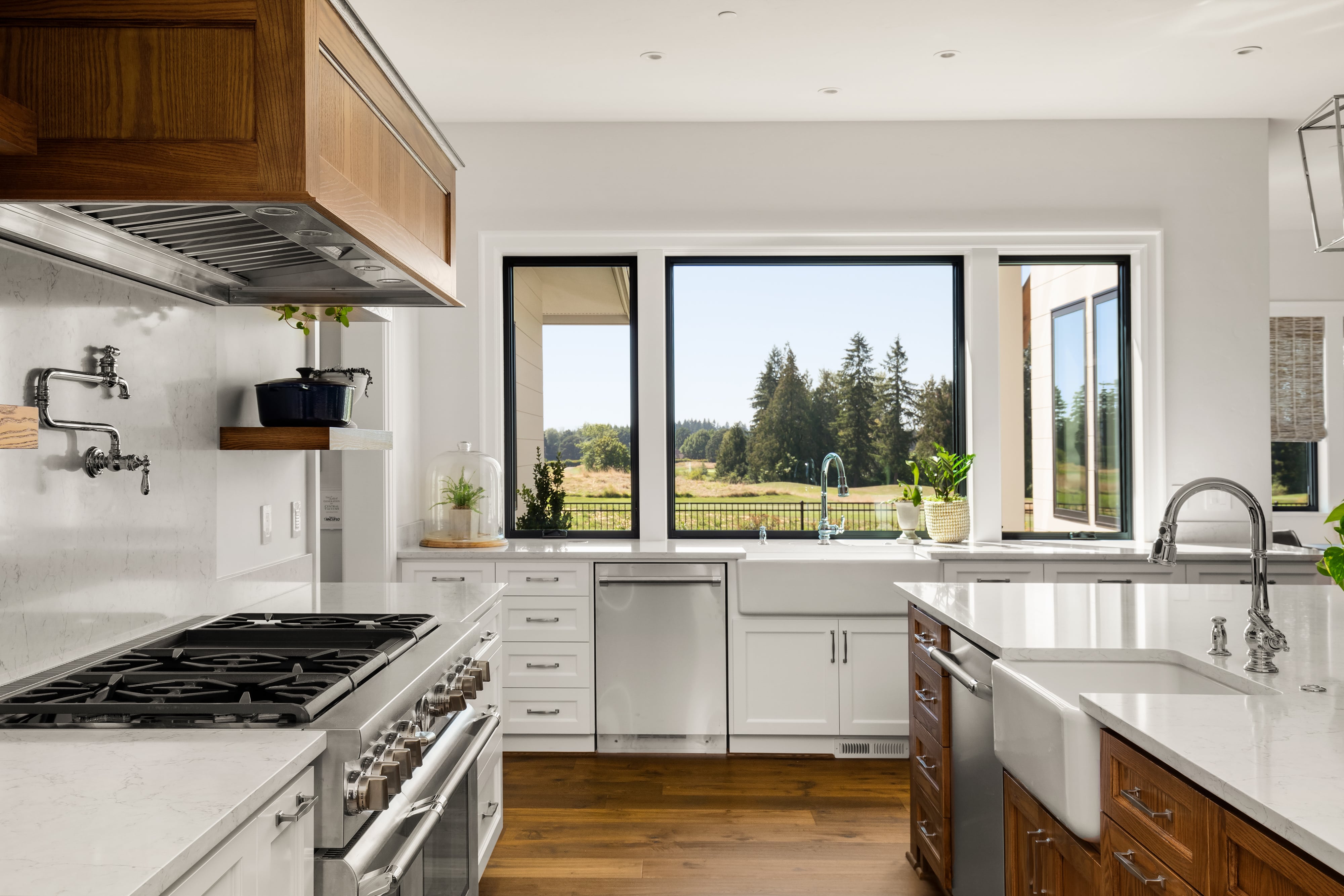
Not to be confused with quartz, quartzite countertops are a natural stone countertop option composed of 90% to 99% quartz grains bonded together by the mineral silica. They’re even more durable than quartz, but tend to be pricier and have fewer color options.
Quartzite Fast Facts
Quartzite countertop cost: About $55 to $75 per square foot (though you can find prices as high as $200)
Heat resistant: Yes, even more so than quartz, though the sealant may be damaged by a hot pan
Stain resistant: No, though sealant helps
Scratch resistant: Yes, it’s a little bit harder than quartz
5. Soapstone
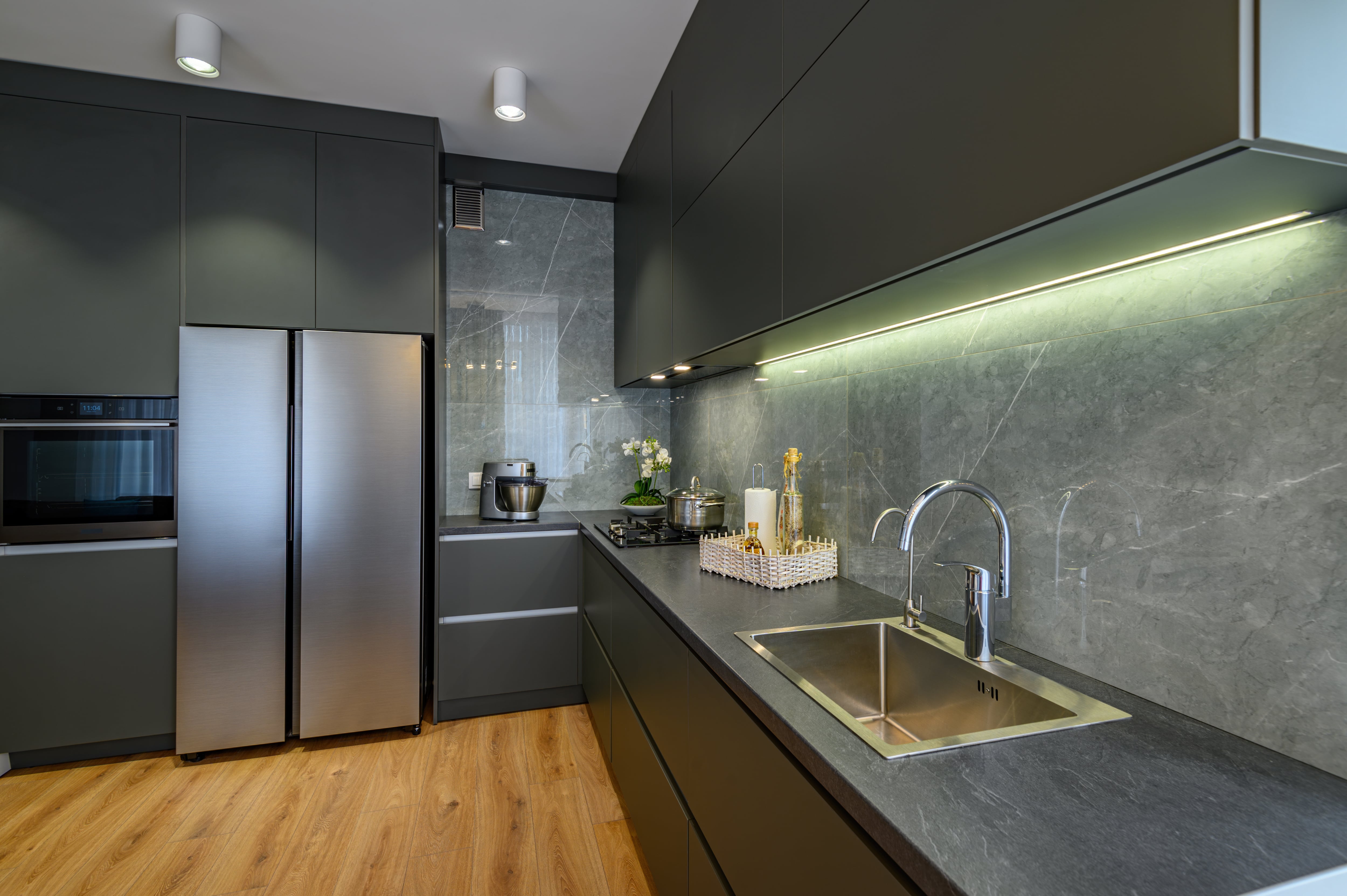
You may not be as familiar with soapstone, but the gorgeous charcoal gray natural stone is becoming more and more popular for luxury kitchen counters. Its striking dark color looks great in modern kitchens, it requires no sealant, and it’s a breeze to clean. However, it’s one of the more expensive countertop materials.
Soapstone Fast Facts
Soapstone countertop cost: About $70 to $120 per square foot (though you can find prices as low as $20 per square foot)
Heat resistant: Yes, you can actually set a hot pan on it
Stain resistant: Yes, even though it is a natural stone, it is nonporous
Scratch resistant: No, it’s a soft natural stone
6. Solid Surface
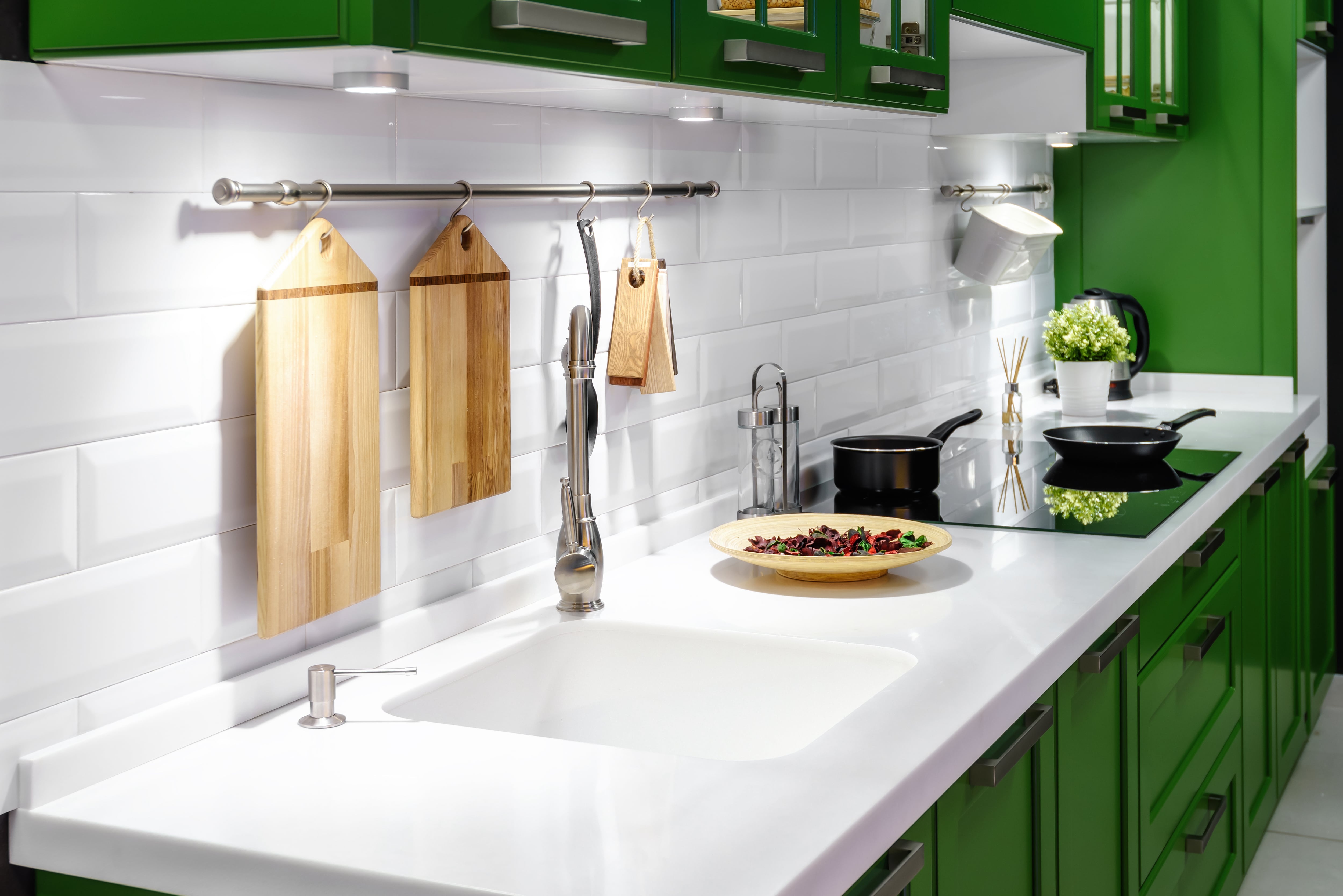
Solid surface countertops, like DuPont’s Corian acrylic-blend, refer to man-made countertops with a consistently solid composition from the inside out. With a uniform color and matte finish, these mid-range countertops tend to look nicer than laminate and are more affordable than natural stone options or quartz. They’re also pretty easy to repair yourself with an orbital sander and fine grain sandpaper.
Solid Surface Fast Facts
Solid surface countertop cost: About $20 to $50 per square foot
Heat resistant: No
Stain resistant: Yes, it's nonporous
Scratch resistant: No, despite what its moniker sounds like, solid surface is soft and can be easily scratched (but also, easily repaired)
7. Butcher Block
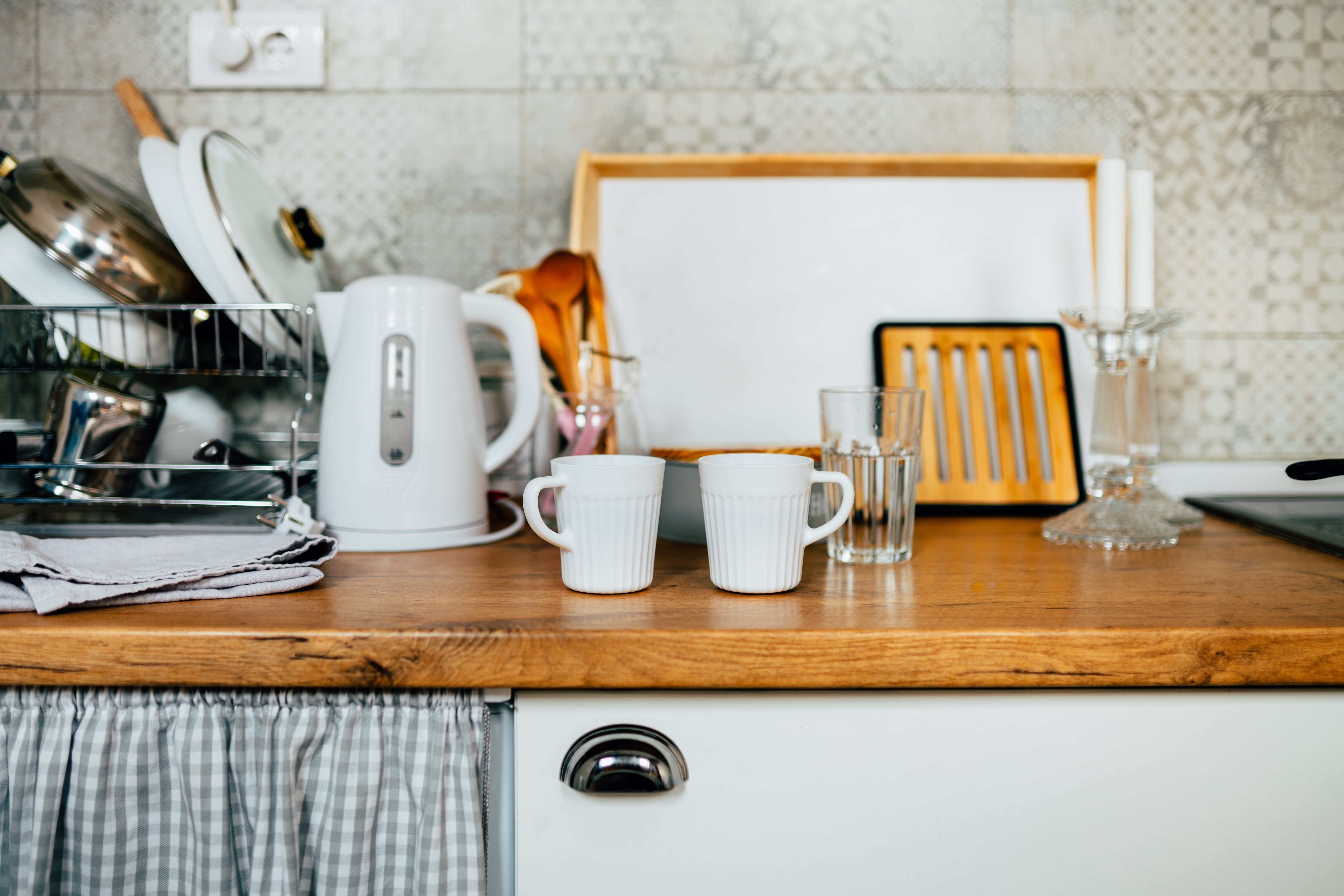
If you have a modern farmhouse or vintage kitchen, butcher block countertops will fit in perfectly. The hardwood infuses kitchens with a homey warmth that can be missing in spaces with luxurious but somewhat cold natural stone counters. Plus, butcher block has a long lifespan with proper maintenance. That maintenance, however, can be a bit extensive and time-consuming. That’s why some prefer to keep it contained to a kitchen island.
Butcher Block Fast Facts
Butcher block countertop cost: About $20 to $70 per square foot
Heat resistant: No, a hot pan can scorch it
Stain resistant: No, though sealant can help protect it and stains can be sanded out
Scratch resistant: No, and definitely don't use it as a cutting board!
8. Laminate
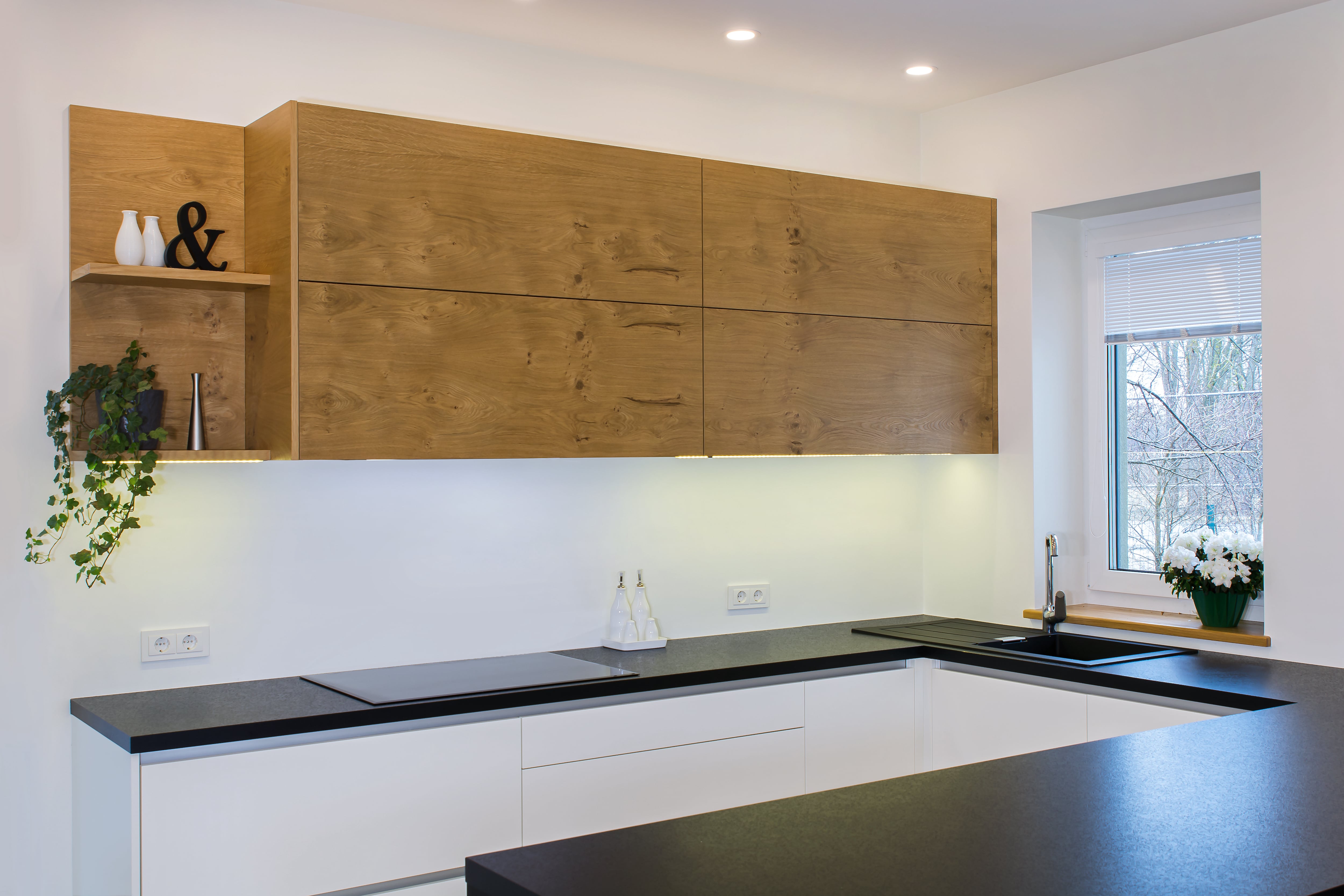
Once considered the black sheep of the kitchen counter world, laminate countertops are making a comeback due to their updated designs and affordability. Yes, laminate is made of layers of paper covered with melamine resin and bonded to plywood or particleboard. But well-designed laminate can mimic granite and even marble. It’s also easy to clean and comes in a variety of colors. And while it won’t last as long as some countertops, it can last a good 30 years with care.
Laminate Fast Facts
Laminate countertop cost: About $8 to $27 per square foot
Heat resistant: No, it’s especially susceptible to heat damage
Stain resistant: Yes
Scratch resistant: No, it tends to show scratches and nicks
9. Concrete
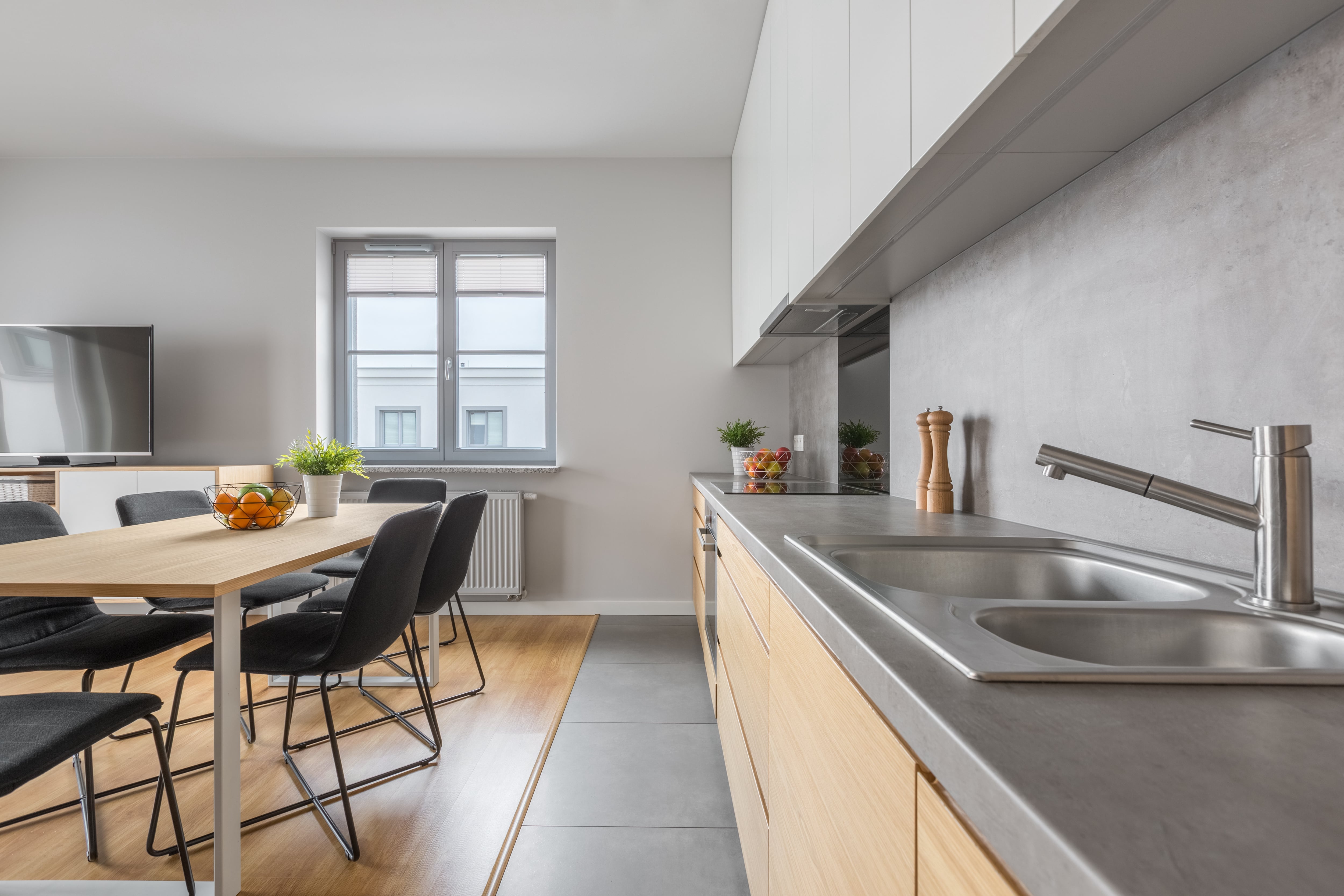
Trendy concrete countertops have become popular in modern kitchens in recent years because they’re long-lasting, durable, and surprisingly customizable. That’s right, concrete comes in a variety of colors—not just gray—and can be further customized with tile or glass pieces added in. It is definitely a luxury countertop material, however, with prices on par with marble.
Concrete Fast Facts
Concrete countertop cost: About $65 to $135 per square foot
Heat resistant: Yes, it’s OK to put a hot pan on it
Stain resistant: No, it’s porous and stains easily, so it’s key to frequently seal it
Scratch resistant: Yes, though if you see a scratch, it’s probably on the sealant and adding more should get rid of it
10. Recycled Glass
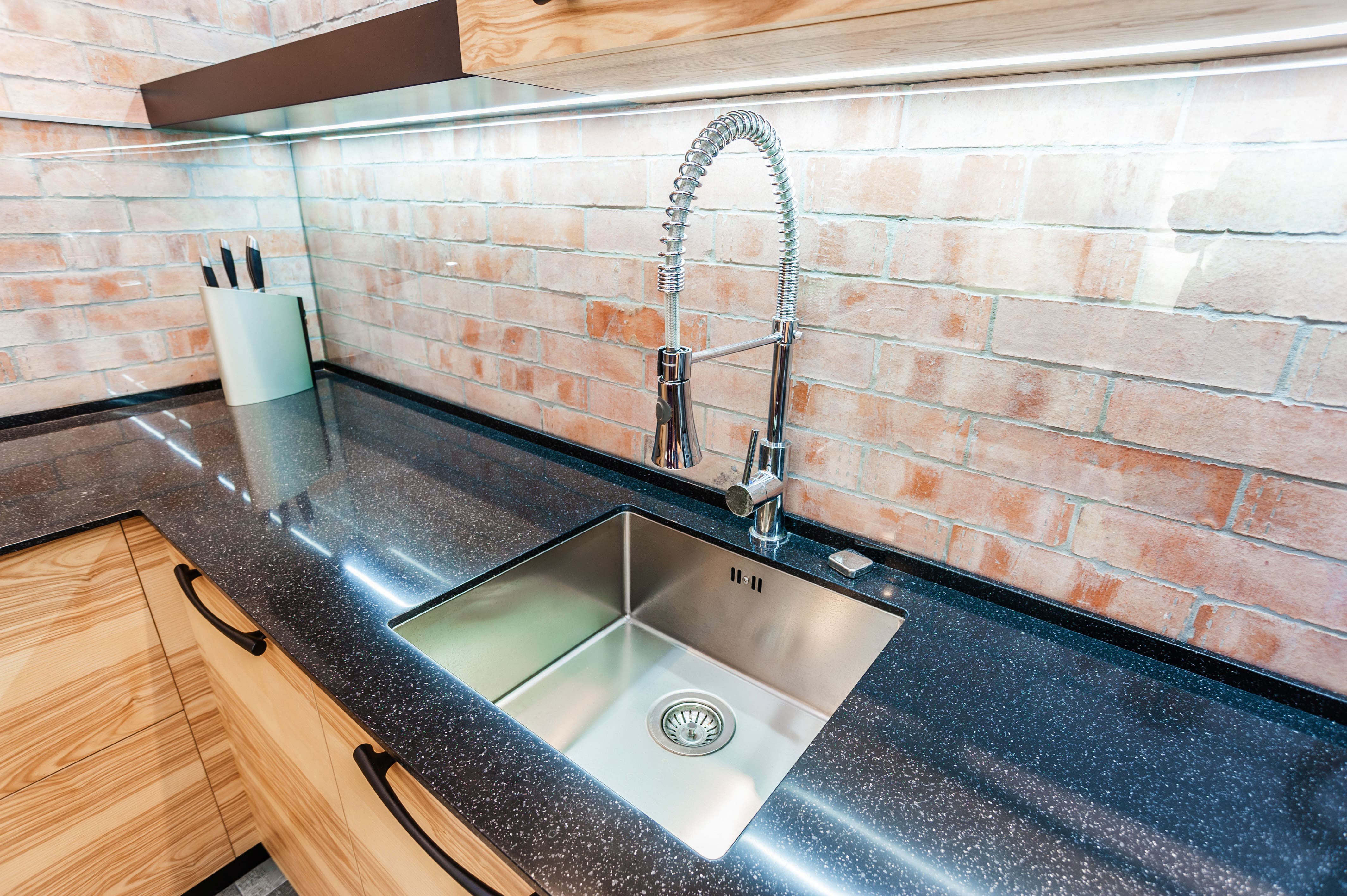
Looking for eco-friendly kitchen countertops? Recycled glass may be for you. These countertops are made with glass that would otherwise be sent to a landfill. The glass is typically broken down into chips and combined with cement and resin binders. The result is a durable everyday countertop with a unique pattern and translucence not seen with natural stone. The biggest downside? Recycled glass isn’t cheap.
Recycled Glass Fast Facts
Recycled glass countertop cost: About $75 per square foot
Heat resistant: Yes
Stain resistant: Yes, when sealed
Scratch resistant: Yes, but it can chip if a heavy object is dropped onto it
11. Tile
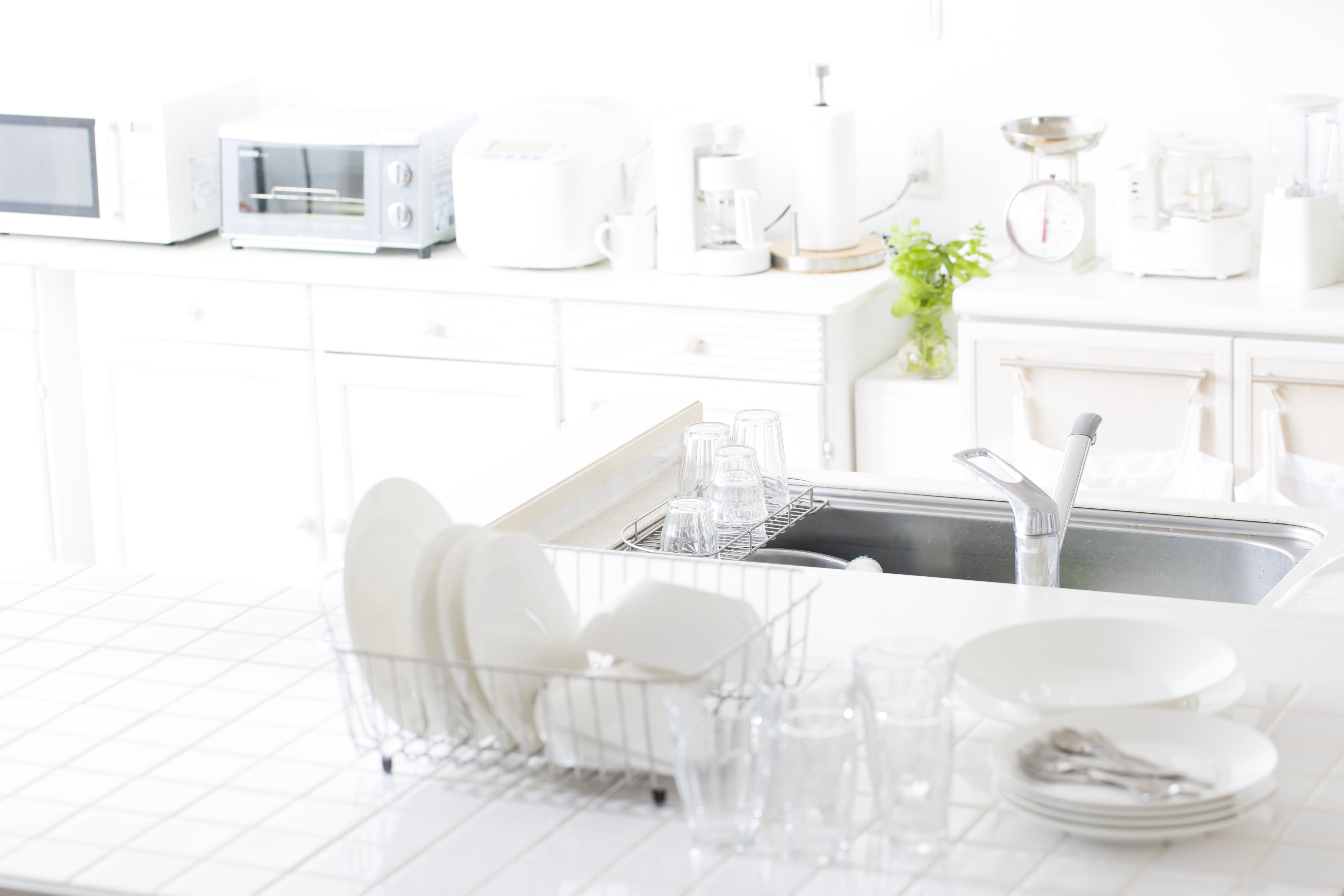
Ceramic and porcelain tiles give homeowners the ability to create custom patterns for their kitchen counters at an affordable price. They come in a wide variety of shapes, sizes, and colors, and they fit well into a modern kitchen. The main concern with tile countertops is that while they are easy to clean, the grout holding them together will eventually become discolored and need to be repaired.
Tile Fast Facts
Tile countertop cost: About $5 to $10 per square foot for ceramic tiles; about $3–$28 per square foot for porcelain tiles
Heat resistant: Yes
Stain resistant: Yes, tile is nonporous
Scratch resistant: Yes, though can chip or crack if something heavy falls on them
Less Common Kitchen Countertop Ideas
If you really want your kitchen to stand out, consider one of these non-traditional kitchen countertop materials:
12. Stainless Steel
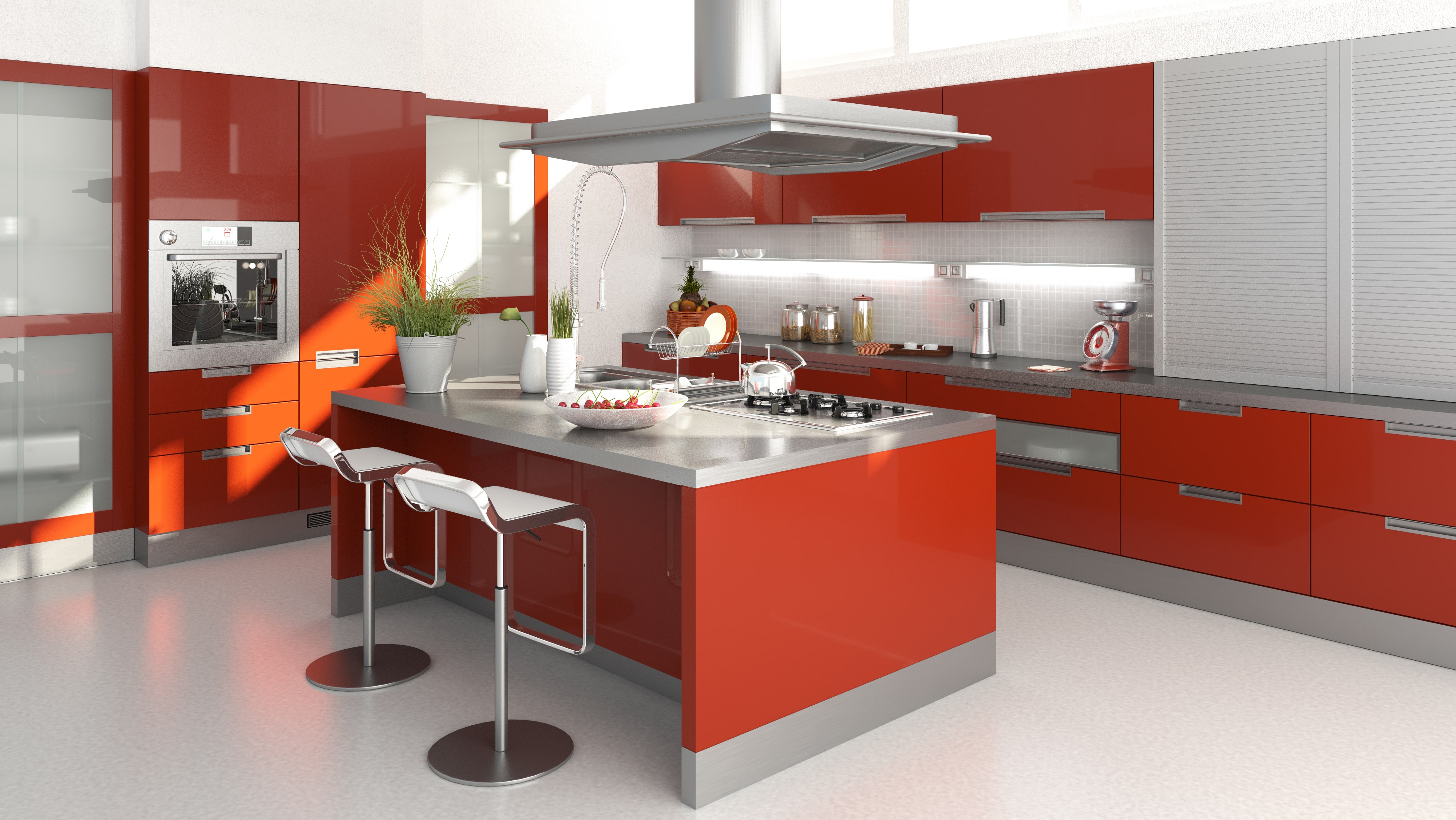
Typically found in commercial kitchens, stainless steel countertops have slowly started to make their way into luxury home kitchens with an industrial look. They’re durable, long-lasting, and easy to clean with soap and water. Unfortunately, metal countertops are not cheap, and their high price tag means they are out of reach for many homeowners.
13. Reclaimed Wood
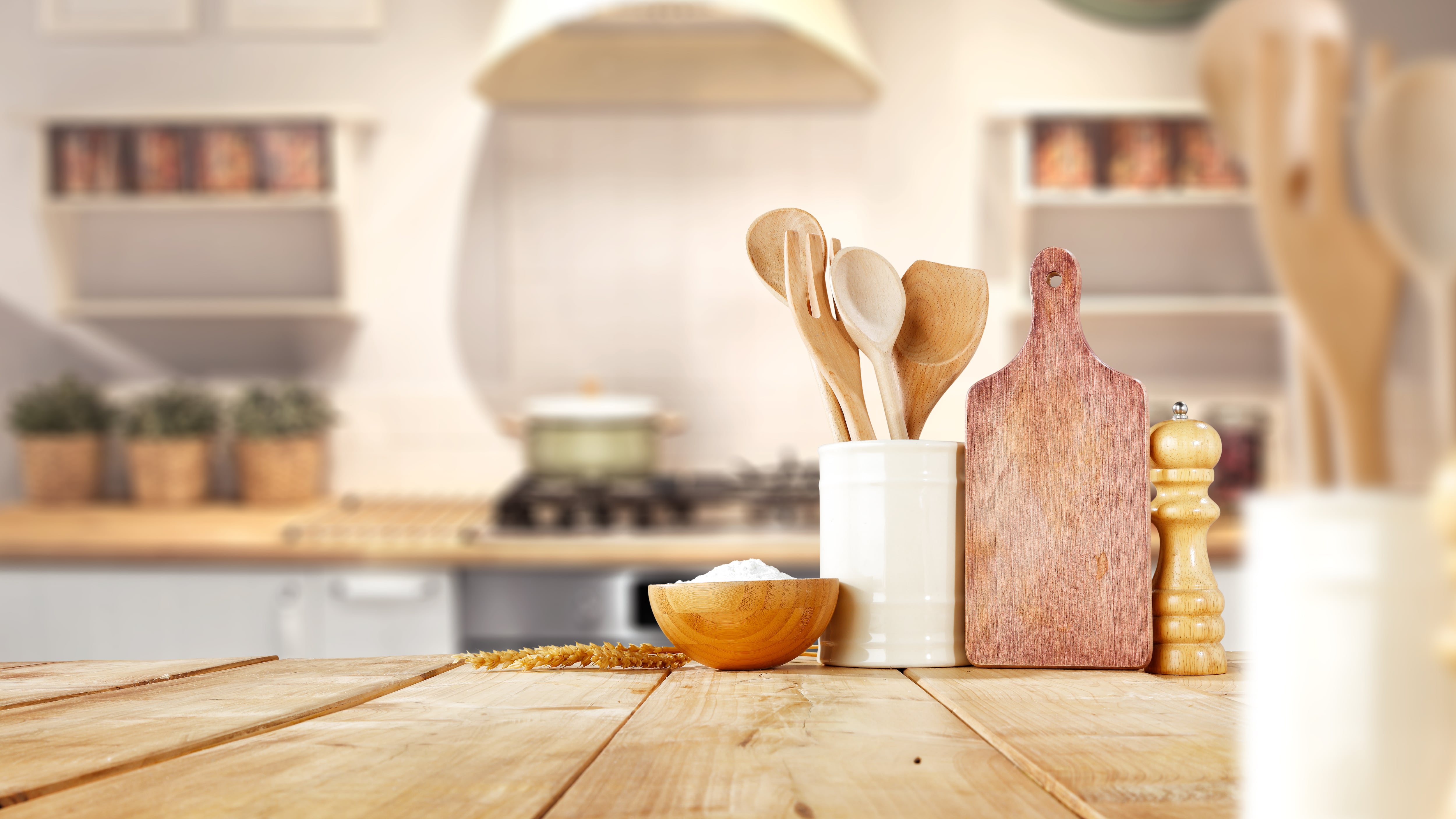
Reclaimed wood countertops—another green countertop option—rely on old, weathered wood to give kitchens more warmth and texture. Like butcher block, these wood countertops are fairly high maintenance and might be best as an accent countertop.
14. Bamboo
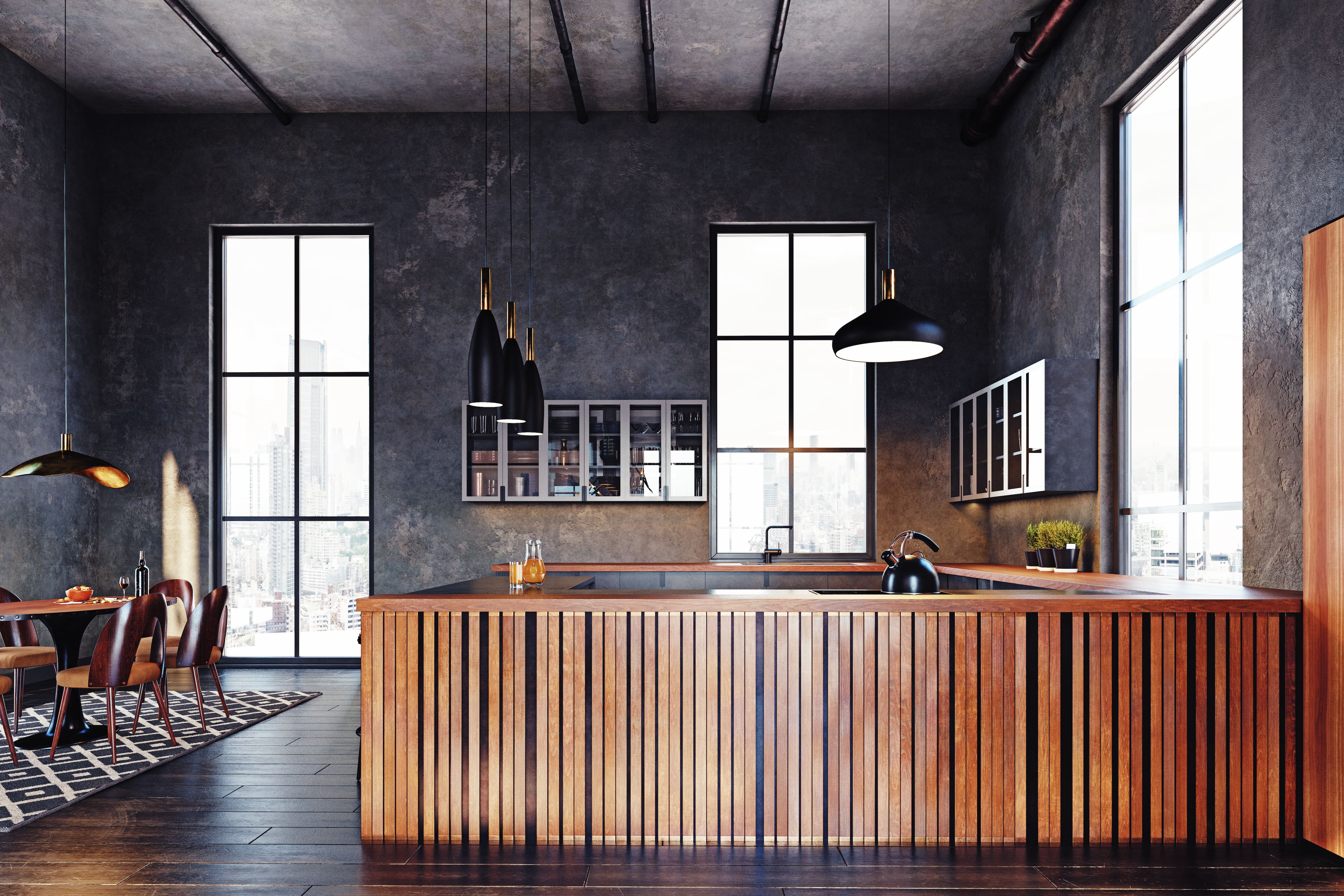
Although it’s technically a grass, eco-friendly bamboo provides a similar look to wood countertops. It’s reasonably priced, durable, and anti-bacterial, but it can be just as high-maintenance as wood so it’s also best used as an accent.
15. Live Edge
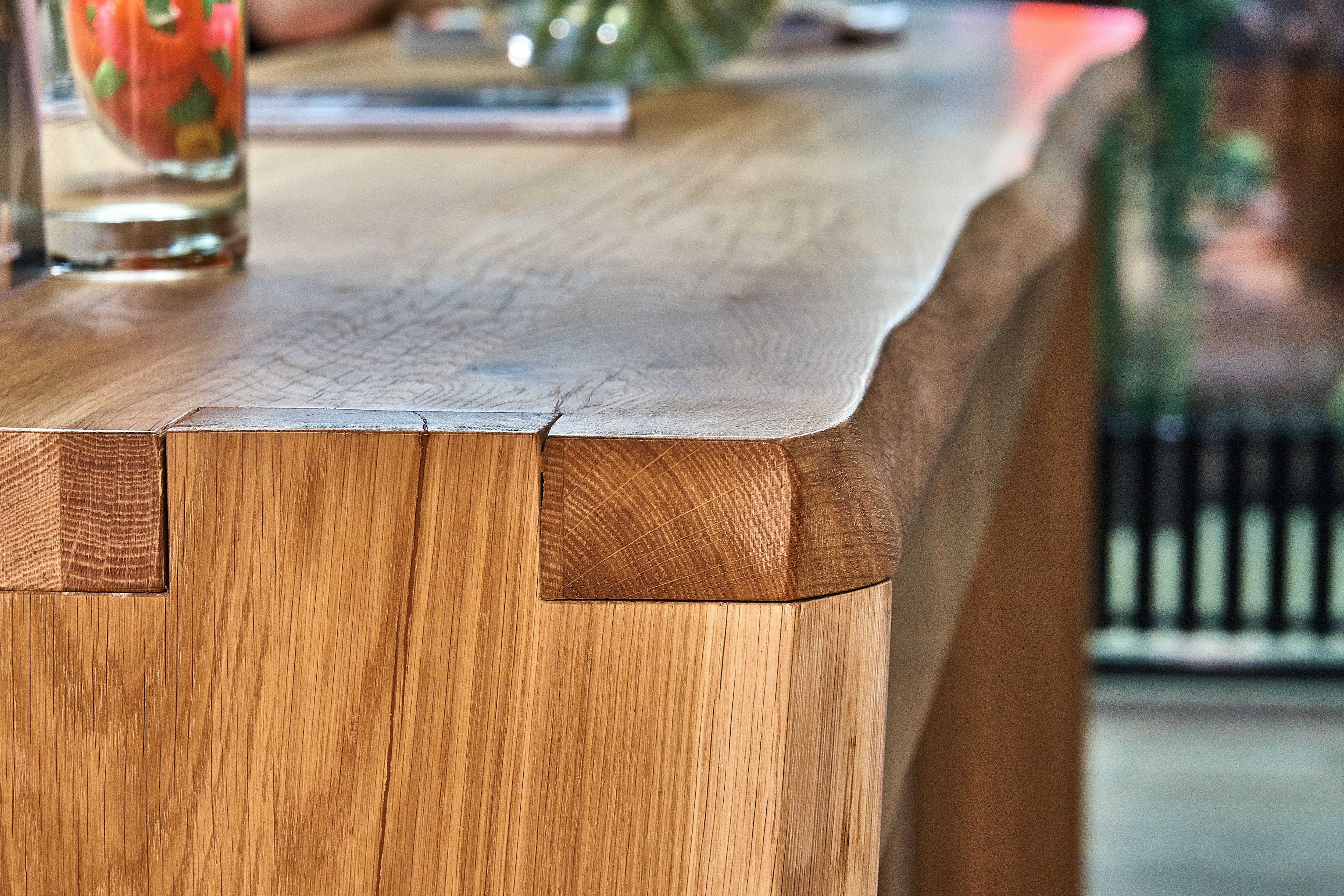
Rounding out the wood counter options is the gorgeous live edge countertop. More work of art than anything else, a live edge counter pays homage to the tree from which it was carved with its curvy preserved edge. If you’re looking for a show-stopping kitchen piece, an island with a live edge may be for you, though it will need lots of care.
16. Waterfall
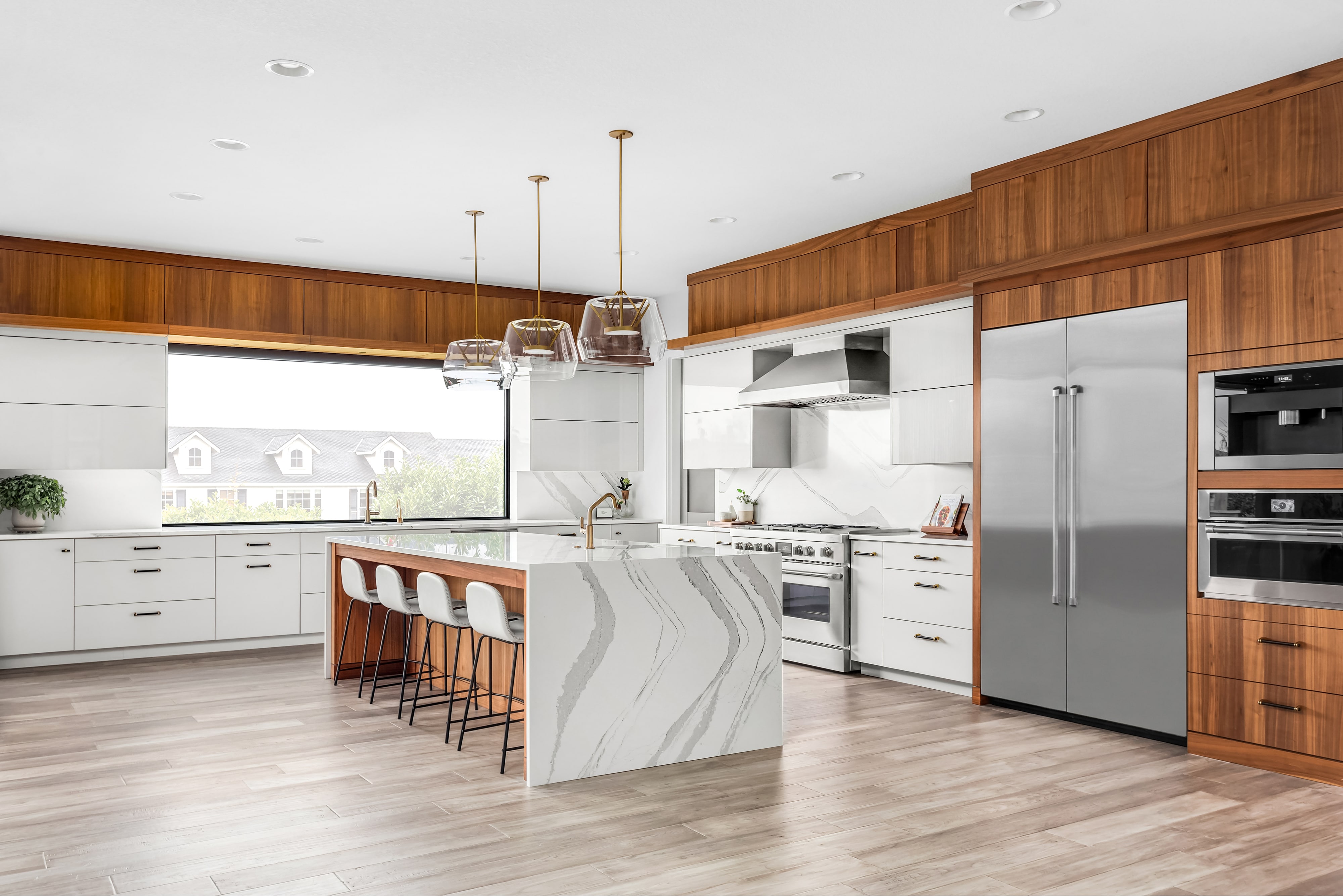
Another kitchen showstopper? The marble, granite, or quartz waterfall countertop. A waterfall countertop extends off the edge of the counter and to the ground, creating a continuous visual flow. It’s perfect for contemporary kitchens and can even be made with concrete or wood.
17. Medium-Density Fiberboard

You may think of medium-density fiberboard as a cabinet material, but it can also be used for countertops. It’s not only a more budget-friendly option, as opposed to marble or quartz, but it also makes for easy upkeep since it has a mild reaction to moisture and is less prone to warping or swelling.
18. Copper

To make your kitchen truly stand out, you can incorporate a copper countertop into the mix. Whether you leave it unsealed or choose to coat it with lacquer, copper is a classic material that can be naturally antimicrobial and, even better, environmentally friendly. If you have room in your budget, copper is a higher-end material that will likely cost about $100 to $140 per square foot.
19. Terrazzo
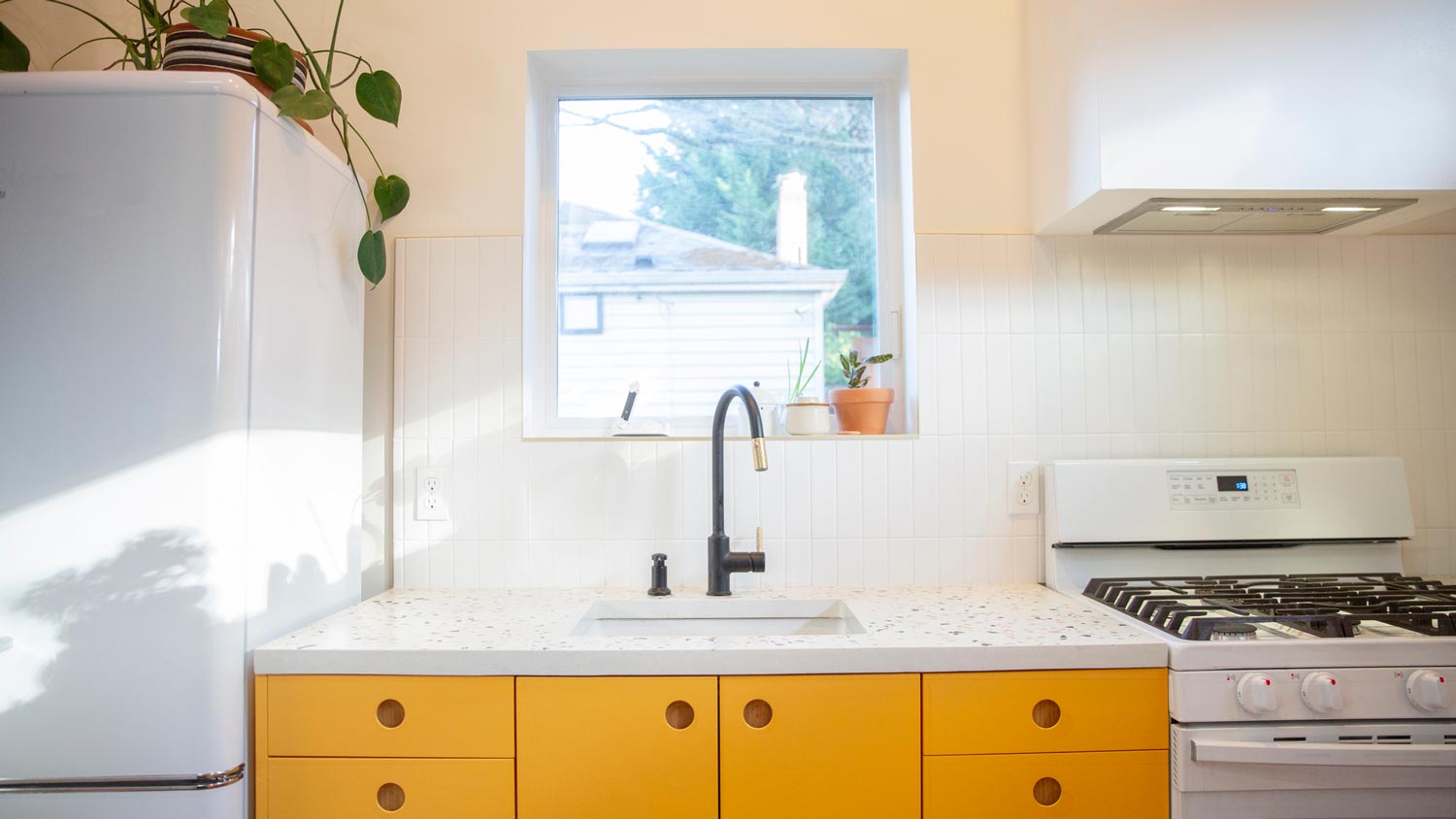
Terrazzo can be just as stunning in a kitchen as in bathrooms, where it’s traditionally used. Plus, if you can find material with speckles that match your kitchen’s color scheme, it will make your space look even more custom. Use it as a countertop or run it all the way up into the kitchen backsplash—either way, it’s a beautiful, functional material that can work as well while you prep food as it does when you wash your face.
20. Barnwood
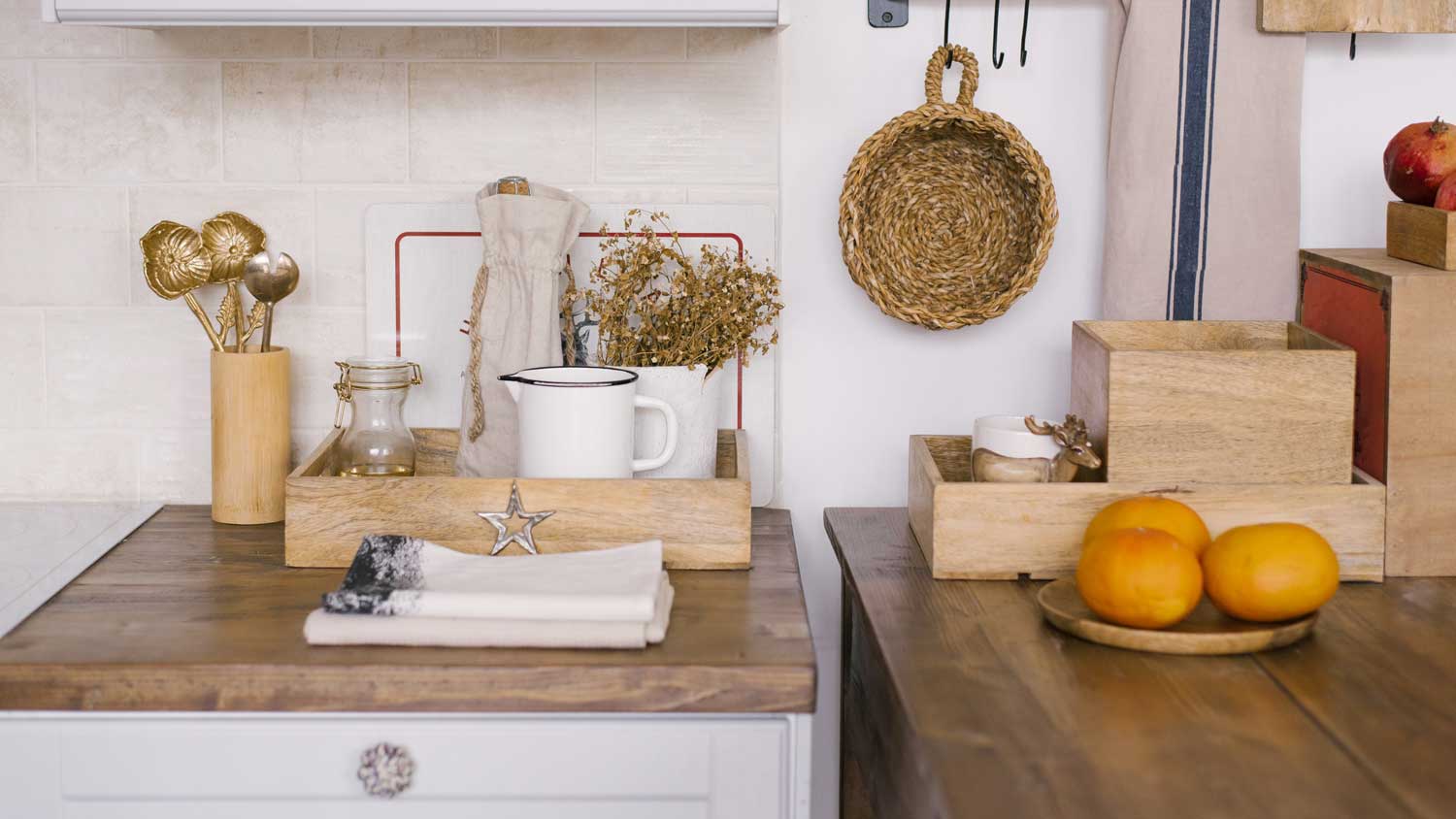
Nothing will make a farmhouse kitchen more authentic than weathered barnwood for countertops. You can use a more traditional material for other areas of your kitchen and save the barnwood to make a statement on an island. Just make sure to have it sealed on a regular basis to preserve its quality and color.
21. PaperStone
If sustainability and eco-friendly living are a priority for you, look no further than PaperStone for your kitchen countertops. Although it was originally created for skate parks, PaperStone can also be used as a countertop material. It’s made from compressed post-consumer recycled paper, so it’s non-porous, bacteria-resistant, and moisture-proof. Plus, it mimics the look of soapstone, so you won’t have to skimp on style.
22. Travertine
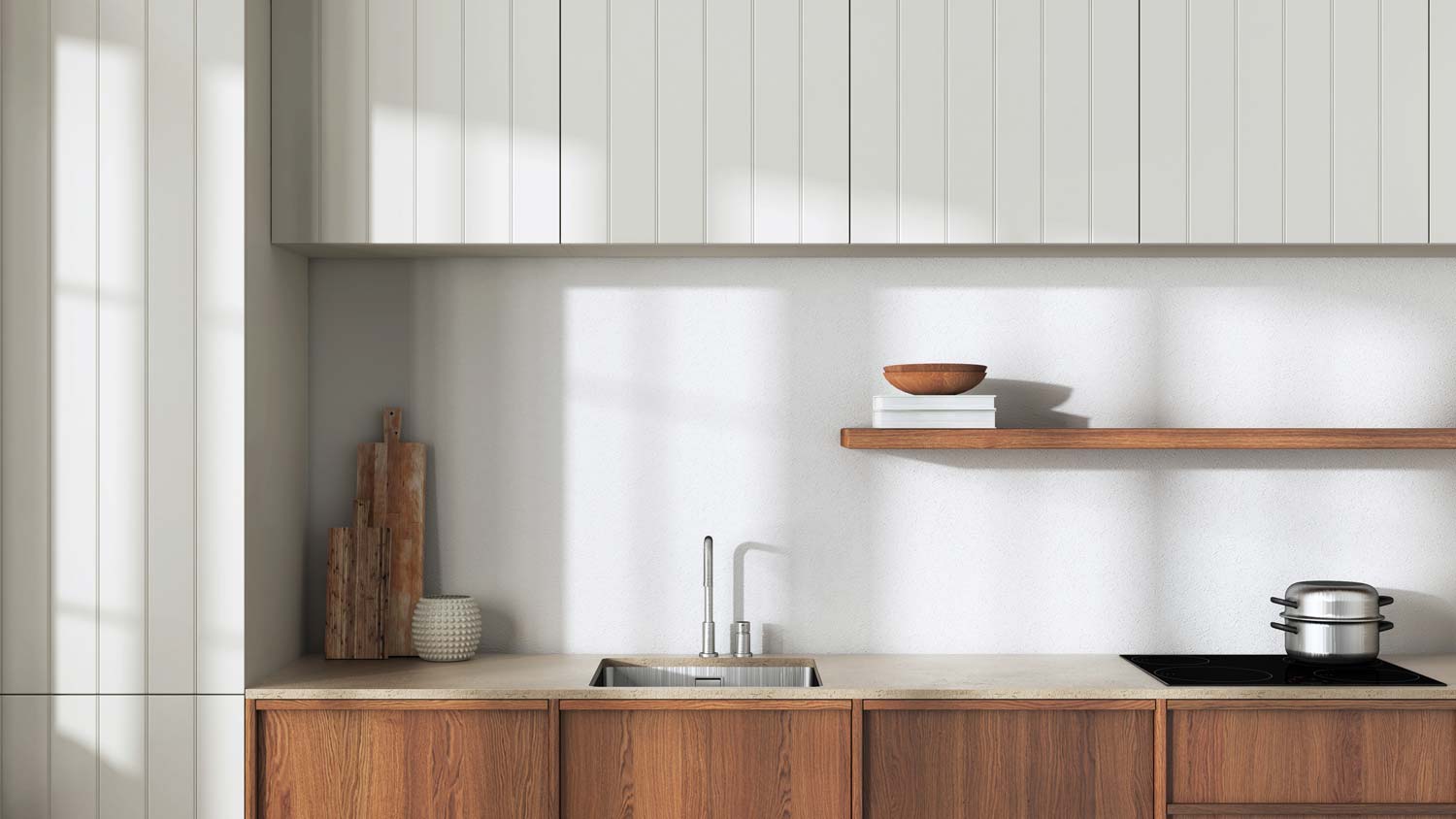
As a natural stone, travertine is a timeless material that can give even the most modern kitchen a lived-in look. It’s especially beautiful in homes with more antique features or design, since it’s meant to look aged. Although it is more susceptible to scratching due to its softness, it is also a more affordable stone than other options on the market.
23. Pyrolave

A fancy word for lava stone, pyrolave is known for its standout color developed during its glazing process. Although it’s a more high-end material, it’s also extremely durable and can handle the hottest of pots and pans directly on its surface without so much as a mark. If you want to add some countertops with serious color to your kitchen, this might be the material for you.





- The Top 10 Types of Countertop Materials for Your Home
- 17 Beautiful Granite Countertop Alternatives
- 9 Low-Maintenance Countertops to Make Your Kitchen Shine
- The Top 7 Types of Stone Countertops for Your Kitchen
- 11 Unique and Unusual Kitchen Countertop Ideas
- 10 Affordable Kitchen Countertop Ideas You’ll Love
- How to Get Stains Out of Different Types of Countertops, From Quartz to Concrete
- 7 Types of Bathroom Countertop Materials to Upgrade Your Space
- How to Cut Countertops for a DIY Kitchen Reno
- 6 Nonporous Countertops to Consider for Your Kitchen















